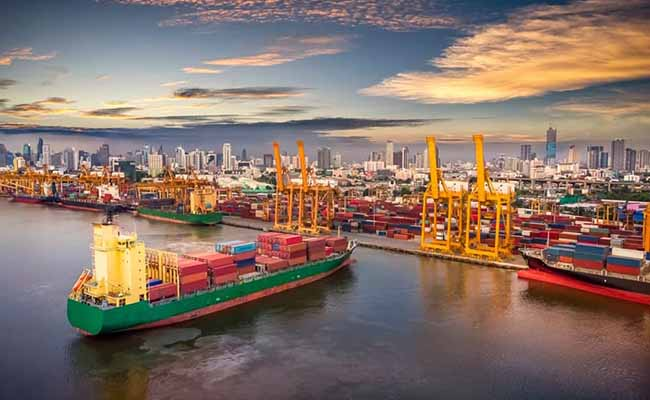GLOBAL LOGISTICS
Whatsapp: +86 13510290734
Email: op@sz-junqing.com

With the development of the global supply chain, more and more Middle Eastern countries choose to purchase goods directly from China, especially bulk commodities such as electronics, household goods, and textiles. Businesses and consumers in the Middle East are increasingly paying attention to purchasing directly from China to achieve lower costs and faster supply. So, how can the Middle East place orders and ship goods directly from China?
The Middle East is a vibrant economy that includes countries such as the UAE,Saudi Arabia,Qatar, Bahrain, Kuwait, Israel and Oman. The Middle East is well-known for its rich natural resources, and many countries are also actively expanding their economies, involving retail, technology, tourism, and construction. As an important trading partner, China provides the Middle East with a wide variety of goods, including electronic products, machinery and equipment, household goods, clothing, and and building materials.

Major ports in the Middle East
Learn more: Top 5 Ports in the Middle East
Major airports in the Middle East:
The main modes of shipping from China to the Middle East are sea and air. For bulk or heavy goods, sea freight is the first choice. By using container shipping, companies can reduce transportation costs, especially when shipping over long distances. Air freight is suitable for goods with high timeliness requirements, such as electronic products, fashion clothing, etc. Although air freight costs more, it is fast and suitable for urgent items.
In the context of globalized trade, the sea freight route from China to the Middle East has become a key link connecting the two major economies. This sea freight route not only carries a large amount of goods, but also promotes cultural exchanges and economic development between the two sides.
The sea freight route from China to the Middle East mainly passes through the Indian Ocean, and the voyage is long, but it has become the first choice for many companies with its stable transportation capacity and low cost. Major ports in China, such as Shanghai Port, Ningbo Port, Guangzhou Port, etc., have direct routes to the Middle East to ensure that goods can quickly and safely reach major ports in the Middle East, such as Dubai Port and Bandar Abbas.
There are various modes of sea freight, including container transportation and bulk cargo transportation. Container transportation has become the main mode of sea freight from China to the Middle East with its high efficiency and convenience. Bulk cargo transportation is suitable for the transportation of bulk goods, such as coal, ore, etc. In addition, sea freight from China to the Middle East also provides a variety of value-added services, such as cargo insurance, customs declaration and inspection, to meet the diverse needs of customers.
As economic cooperation between China and the Middle East continues to deepen, the demand for air freight from China to the Middle East is also growing. Compared with sea transportation, air freight is faster and more timely, and is suitable for the transportation of high-value and urgently needed goods.
Air freight routes from China to the Middle East cover a wide range, connecting major cities in China with multiple international airports in the Middle East. These routes not only provide convenient export channels for Chinese companies, but also provide a stable source of goods for importers in the Middle East. Through air freight, China’s high-tech products, electronic products, clothing, etc. can quickly enter the Middle East market to meet the needs of local consumers.
The timeliness of air freight is one of its biggest advantages. For urgently needed goods, such as medical supplies, fresh products, etc., air freight can ensure that they are delivered to the destination in the shortest time. In addition, air freight also provides a variety of value-added services, such as cargo tracking, temperature-controlled transportation, etc., to meet the diverse needs of customers.
When importing goods from China to the Middle East, choosing the right door to door service for your shipping needs is essential to ensure a seamless, efficient and cost-effective logistics operation.
What is door to door service?
Door to door service is an integrated shipping solution where the logistics provider manages the entire process from origin to final destination. This includes cargo collection, transportation, customs clearance and door-to-door delivery. It simplifies the logistics process by providing a single point of contact and reduces the complexity of international shipping.
There are several benefits to choosing door to door service:
Basenton Logistics is a freight forwarding company that focuses on transportation from China to the Middle East, providing customers with a full range of transportation solutions. The advantages of Basenton Logistics include:
Purchasing directly from China and arranging transportation to the Middle East can effectively reduce procurement costs and improve supply chain efficiency. Understanding the advantages and disadvantages of different transportation methods and choosing the appropriate transportation plan according to the type of goods and timeliness requirements will help achieve better logistics results. Through professional companies such as Basenton Logistics, customers can easily cope with various challenges of cross-border transportation and achieve an efficient and convenient logistics experience.
DDP Shipping from China to Guatemala-Junqing Logistics, a leading international freight forwarder in China, has extensive experience in shipping from China to Guatemala and offers one-stop solutions, including ocean freight, air freight, direct delivery (DDP), and door-to-door services.
2025-09-05
Shipping cost from China to Gambia-China freight forwarding services serve as a crucial bridge for trade between China and Gambia, providing professional support for businesses requiring more flexible transportation options.
2025-09-18

More →

More →

More →

More →

More →

More →

More →